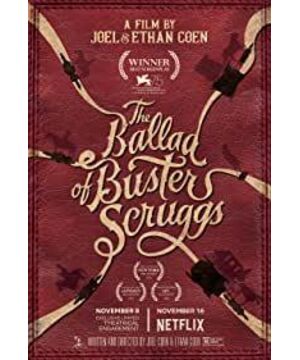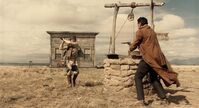"The Ballad of Buster Scruggs"
Maybe I don't have a natural sense of foreign language, and I can't remember the name of the movie. Well, small surprises happen from time to time, such as being catchy now.
The film consists of six short stories, and the title is named after the protagonist of the first story. Of course, it is not enough to cover the main point of the whole story, but the title is accompanied by Buster Scruggs' rhythmic, cheerful Playing and singing, we entered the western world of the Coen brothers as vivid as a storytelling. It is worth mentioning that the desolate and lonely Westworld has nothing to do with vivid images. Here, in spring, summer, autumn and winter, the speed of the changing seasons is far less than the fickle life.
So life is impermanent, you have to be strong. Ok!
Let me tell you one of my favorite stories, "Meal Tickets".
"Meal Ticket", as the name suggests, treats something as a tool to make money and eat. The boss of the film relies on Harrison, who is disembodied but well versed in literature, to make a living giving speeches everywhere. When the audience loses the novelty of Harrison, a cock that does the math takes his place. Ultimately, Harrison lost the value of making money and was thrown into the river by his boss.
As described in the promotional posters affixed to the tour wagon: Harrison is the wingless thrush of an orator and actor. When he recites emotionally: In lamentable times, everyone spurns out, and weeps alone for wandering in the world. Complaining that the sky didn't hear Xi's call in vain, Gu Ying felt sorry for herself and her fate was cruel. I don't know if Harrison was thinking about his own life experiences when he delivered this Shakespeare poem. But in his soulful eyes, I saw a burst of loss and sadness.
There are several houses scattered on the slope of the mountain, forming a quiet street market, which seems to be deliberately surrounded by frozen black trees. Harrison was on the slope of the mountain, day after day, speaking again and again. There are times when the days are dry, and only speech or literature can soothe his broken body. Compassion, like snowdrops, descended from the sky and landed in the mountains and forests. Harrison raised his head and stretched out his tongue to lick. This kindness was really not out of reluctance.
During the period, there was no communication between the boss and Harrison. When Harris was making money for the boss, the boss would help him with makeup, feeding and going to the toilet. The silence gave some slight weight to the cold air, as if sitting alone on the bottom of the sea, but Harris always seemed to want to say something to the boss. The eyes that were hesitant to say anything seemed to have turned into a cloud of smoke, and it seemed that even the slightest The weight is gone. People's freshness comes and goes quickly. When a rooster that can count attracts people's attention, the boss buys the rooster, and buys a large bag of grain for the chicken, which is also fed. In the eyes of the boss, there is no difference between people and things that lose their value. The reality is always cruel and ruthless, and I hope Harrison says: the government of the people, by the people, and for the people shall exist forever in the world.
The winter in the west is a dark green that filters through layers of lenses, suppressing the vitality of green trees, giving people no hope at all.
Shelley's King of Kings, Ozymans Dias's sculpture finally stretched out around the vast ruins of yellow sand, lonely and desolate. The romantic poet Shelley once gave a good faith in the future: when winter comes, will spring be far behind? It seems to me that Harrison's spring will never come again when the snow flows along the river. He was full of economics, but like a hard rock, he sank to the bottom of the water forever.
Finally, I'd like to use Shakespeare's sonnets to whisper to Harrison in the story:
But occasionally thinking of you is like a lark, flying from the hazy earth to the clouds at dawn to sing incessantly.
View more about The Ballad of Buster Scruggs reviews











